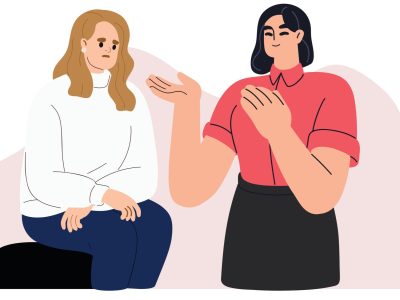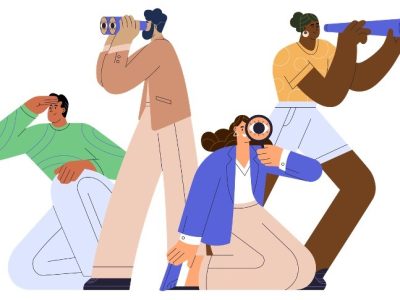Meeting our Mental Health Emergency:
Embracing a Lay Counseling Workforce
We are in the midst of a grave mental health emergency in this country. Rates for young people with depression, anxiety, trauma, loneliness and suicidality are soaring, and adults are faring only slightly better, with both mental health and substance use disorder rates continuing to increase dramatically. In the recent State of the Union Address, President Biden spoke about the severe mental health clinician workforce shortage, that is both a driver and an outcome of this emergency.
There are millions of people who need mental health care and not enough mental health professionals to meet the need. The brunt of this shortage is borne by people of color, who have the least access to high quality mental health care.
The time is now, to embrace and invest in a lay counseling workforce. Lay counselors- trained helpers who do not have a traditional mental health educations, master’s degrees, or licenses- can provide crucial support, comfort and care to those who are suffering.

UNLICENSED HELPERS IN WORKFORCE CURRENTLY
Non-licensed helpers exist in the US in many areas, including intimate partner violence survivor support, suicide prevention hot and warm lines, smoking cessation programs, health education and coaching, and HIV programs. The addiction field has long relied on helping professionals who do not have master’s degrees, licenses, or traditional mental health educations.
Case managers, care coordinators and community health workers are now present in most health and social care organizations, expanding the healthcare team and underscoring the importance of these positions in supporting patients.
In addition, the movement to integrate peer helpers and others with lived experience, particularly in the community mental health field, has continued to grow, driven by an understanding that degrees and licenses are not the only type of learning and experience that is valuable in helping others.
These examples are heartening, as they indicate a diversification of the helping workforce beyond licensed professionals, and a broadening of the criteria we use to decide who can be helpful.
In the mental health field, however, there has been historical resistance to the idea of a lay workforce to provide mental health counseling.
LIMITS OF THE CURRENT SYSTEM
Reliance on education and licensure as proxies for effectiveness
The field’s emphasis on formal education and licensing can obscure what we know makes an excellent, effective clinician.
Having masters or doctoral degrees and licenses to provide therapy does not indicate emotional intelligence and maturity, self-reflection, insight, intellectual humility, or even skillful communication. Degrees and licenses do not indicate an allegiance to equity principles, a commitment to working on our own “stuff’ or devotion to lifelong learning. We also know that a degree or license is not a guarantee of skill or effectiveness. We’ve all sought therapy from practitioners who were, despite their credentials, sub-standard.
We recognize that there are many barriers that prevent talented helpers from obtaining degrees and licenses: financial, social, and racism barriers; barriers of conditioning (from growing up in a particular family or community); barriers for women who are primary caretakers, and others. These barriers drive the disparities in the field: Over 84% of psychologists, 76% of licensed marriage and family therapists and approximately 67% of licensed clinical social workers are white.
Relying on lived experience as a proxy for effectiveness
While the movement toward using lived experience to broaden the workforce is heartening in its aims, it may be misguided and limiting for those who would be skillful helpers.
In the addiction field, for instance, there is a widespread misconception that those with histories of addiction and recovery are the best counselors, despite the fact that there is no evidence to support this belief. Lived experience can also result in less humility and curiosity for another; instead, defaulting to over-relating and assuming we know how someone feels, what they need or what they should do.
We’ve all known the deep relief that comes from talking to someone who “gets” where we are at, someone who we feel understands us and who imbues us with hope that we too might get through this. This feeling of understanding, relief, and hope isn’t always the result of meeting someone with the exact same experience as us, though. Most often it comes from the reflection of a deeply skillful helper who conveys empathy, understanding, and hope, unrelated to whether they have experienced exactly what we have.
What if we evaluated helpers by personal attributes, skills, and effectiveness, rather than by degrees, licensure or lived experience?

EVIDENCE SUPPORTING LAY COUNSELING
Lay counseling is widespread in low and middle income countries, where it has been used to fill a severe resource gap– much like the one we are experiencing in the US. Research has shown lay counseling in these countries has been effective for multiple mental health conditions and populations.
In the US, lay counseling has been shown to be effective, including using telehealth. Most interestingly, there is research showing lay counselors compare favorably to licensed therapists, with most studies showing no differences in treatment outcomes, between services delivered by licensed therapists vs. lay counselors. This shouldn’t be taken as evidence that anyone can provide mental health counseling- delivering high quality mental health services is a highly skilled endeavor. The evidence is only a confirmation that lay counselors can be highly skilled- as skilled as licensed practitioners, with the right orientation, characteristics, training, and support.
QUALITIES OF EFFECTIVE COUNSELORS, WITH OR WITHOUT DEGREES OR LICENSES
Ultimately, what matters most in mental health counseling is a set of orientations, characteristics, and aptitudes, and a consistent, supportive, reflective environment in which to practice.
For example:
- A stance of self-reflection and self-awareness
- A stance of constant striving toward unconditional empathy & equity
- A commitment to do the ongoing work of identifying barriers to the above, in our own conditioning
- Commitment and ongoing practice within a deep, dynamic, safe learning community and a robust network of mentors
- A commitment to one’s own personal growth, one’s own “work”
- A deep belief that others know what is best for themselves; that helpers are not experts on others’ lives
- A love of connection, communication, and a relational way of being.
- Highly proficient interpersonal and communication skills
- A deep and profound capability to hear and hold others distress, anger, fear and other strong or difficult emotions, without undue distress, reactivity or trying to “fix” the other person
- Humility, curiosity, and growth-mindset, coupled with an openness to learning, feedback and support

MOVING FORWARD: CALL TO ACTION
To quote a line from Ego, the food critic in the Pixar movie Ratatouille, “…not everyone can become a great artist, but a great artist can come from anywhere.” Not everyone can be a skillful, effective counselor, no matter how much training and support is provided. Embracing a lay counseling workforce means creating a pathway for those without behavioral health degrees or licenses, who are already deeply skilled, and providing them with additional resourcing and support.
For leaders working in organizations where access to licensed clinicians is impacted, consider the people who spend significant time with patients: case managers, community health workers and care coordinators, addictions counselors, health educators and others, and Identify those that have the core characteristics, orientations, and aptitudes for lay counseling. We can elicit their interest in receiving focused and in-depth resourcing to become a lay counselor. In most organizations, adding even 1 or 2 full time lay counselors would dramatically impact access to vital behavioral health services. Adding 5 or 10 lay counselors might double some BH department’s size, even making wait lists obsolete.
For those of us who are licensed clinicians, we should mitigate “opportunity hoarding” through occupational licensing and focus on promoting lay counseling within our organizations. We can increasingly use our experience and knowledge to identify, grow, teach, and support lay counselors. We can collaborate with administrative leaders to create infrastructure that promotes continual learning, safety, and support for lay counselors.
For healthcare leaders in philanthropic organizations, government, or health plans, it is time to pave the way for an expanded mental health counseling workforce, financially and legislatively. While some states are expanding payment for unlicensed helpers, such as CalAIM in California, these fall short of covering mental health counseling.
THE PROMISE OF A LAY COUNSELING WORKFORCE
There are thousands, perhaps tens of thousands, of people who, in the context of a rigorous, supportive, collaborative learning community can provide safe, compassionate, high quality mental health care to those who are still suffering. In this moment, we have an opportunity to transmute these last few years of hardship, shortage, scarcity and suffering into something creative, generous, and just.

 PS. Email me or check out our flyer to learn more about EM Consulting’s Lay Counselor Academy!
PS. Email me or check out our flyer to learn more about EM Consulting’s Lay Counselor Academy!



